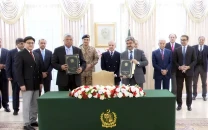From wastewater pond to community lifeline
Group of young people transforms wastewater pond into asset for Darya Khan Talpur village

"Where there's a will there's a way," goes an old adage. This is exactly what has happened in a small village in Matiari. In the village Darya Khan Talpur, a group of local youth has transformed a once-neglected wastewater pond from an environmental hazard into a community asset.
The pond, built by the government three decades ago as a wastewater stabilisation facility, had long been abandoned and mismanaged. Instead of fulfilling its intended purpose, the pond became a trash-pile for the village's 3,100 households. Over time, this caused not only an eyesore but also posed serious health risks to the residents.
"I realised the importance of water when I saw how precious it is in cities, where people pay for it, while in rural areas, we often take it for granted," said 20-year-old Haris Khaskheli, a member of the youth group leading the transformation effort.
Haris and his team of eight local youths decided to restore the pond's functionality. Their first step was to repair the government's long-neglected pumping machine, an essential tool for managing the pond. "We restored the power supply to the pump," Haris said, describing the team's early success in reviving the facility.
Just as the team's efforts began to gain momentum, heavy rains hit the village in 2024, flooding the pond with stagnant water that threatened to remain for weeks. Cashing in on this opportunity, the group worked to channel the rainwater into the pond, preventing potential flooding in the village.
"The villagers were very supportive when we struggled to direct the rainwater," Haris recalled. "Everyone was amazed and grateful to see young people taking the initiative to improve the situation."
For the first time, rainwater was conserved in the village. Once the rains had passed, the stored water became an invaluable resource for irrigation of fields. The group also began repurposing domestic wastewater for farming, further enhancing the pond's utility.
The young men expanded their efforts by organising community sessions on sustainable practices, such as kitchen gardening and water reuse. "We've distributed around 200 trees to promote eco-friendly practices," said Haris, acknowledging the growing support from the villagers who now look to the group as leaders in environmental stewardship.
"The youth have incredible potential if we give them a chance," said Javed Hussain, head of the Sindh Community Foundation. Hussain highlighted the importance of training young people on climate change and environmental issues. "We have trained 825 youth from Thatta, Sanghar, and Matiari in various phases of these programs. These young, energetic minds represent the future, and we need to equip them to handle upcoming challenges."
He also stressed the need for more support for youth outside provincial capitals. "Government, private sectors, and organizations must back the youth and their innovative ideas to create sustainable solutions for the future."



















COMMENTS
Comments are moderated and generally will be posted if they are on-topic and not abusive.
For more information, please see our Comments FAQ